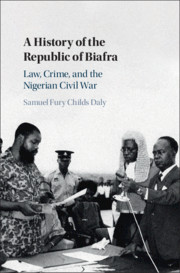Crossref Citations
This Book has been
cited by the following publications. This list is generated based on data provided by Crossref.
LU, VIVIAN CHENXUE
2022.
Emplacing capital.
American Ethnologist,
Vol. 49,
Issue. 4,
p.
491.
Lu, Vivian Chenxue
2022.
Ordering life and law in a besieged African secessionist state.
Cultural Dynamics,
Vol. 34,
Issue. 3,
p.
251.
Peters, Prince E.
Okwueze, Malachy I.
and
Agbo, Paulinus O.
2022.
‘To your tents, O Nigeria’: An exegetical study of 1 Kings 12:1–16.
Verbum et Ecclesia,
Vol. 43,
Issue. 1,
Ejiofor, Promise Frank
2022.
Jewishness without Jews? Ontological Security, Ethnonationalism, and the Social Power of Analogical Reasoning in Postcolonial Nigeria.
Nationalities Papers,
p.
1.
Peša, Iva
2022.
A Planetary Anthropocene? Views From Africa.
Isis,
Vol. 113,
Issue. 2,
p.
386.
Bjerk, Paul
2023.
Agency and the Arusha Declaration: Nyerere, NUTA, and Political Discourse in Tanzania, 1966–7.
The Journal of African History,
Vol. 64,
Issue. 3,
p.
368.
BOLAT, Eren
2023.
Afrika, Sömürgecilik, İç Savaşlar ve Afrika Edebiyatındaki Yansımaları.
Anemon Muş Alparslan Üniversitesi Sosyal Bilimler Dergisi,
Vol. 11,
Issue. Afrika,
p.
256.
Munyoka, Elvis
and
Goel, Kalpana
2023.
Handbook of Critical Whiteness.
p.
1.
Chiluwa, Innocent
and
Ononye, Chuka Fred
2024.
The #PantamiMustGo political activism: A textual analysis of narrative agency in protest discourse.
Discourse Studies,
Vol. 26,
Issue. 2,
p.
173.
Sule, Babayo
and
Sambo, Usman
2024.
Presidential Elections in Nigeria's Fourth Republic.
p.
31.
Bos, Colin
2024.
“How Our Heritage is Looted”: Legal Meaning-Making, Cultural Property, and Customs Enforcement in Nigeria, 1938–79.
The Journal of African History,
p.
1.
2024.
Soldier’s Paradise.
p.
37.
Ayalogu, Chichi
2024.
Visual culture and the politics of humanitarian consumption: The case of the Biafran gambit.
Journal of Postcolonial Writing,
p.
1.
2024.
Soldier’s Paradise.
p.
167.
Nweke, Obinna Chukwunenye
and
Lee, SungYong
2024.
Time, temporality and the reintegration of ex-combatants after the Nigerian-Biafra War.
Conflict, Security & Development,
Vol. 24,
Issue. 4,
p.
299.
2024.
Soldier’s Paradise.
p.
101.
2024.
Soldier’s Paradise.
p.
143.
Witt, John Fabian
2024.
The Cambridge History of International Law.
p.
330.
2024.
Soldier’s Paradise.
p.
249.
2024.
Soldier’s Paradise.
p.
1.



